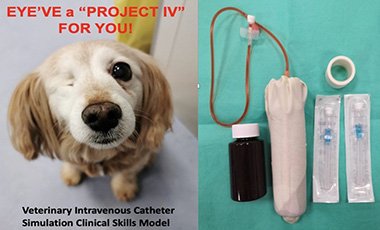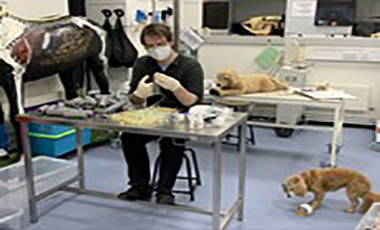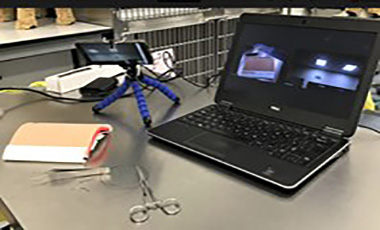Project IV: Student Veterinary Clinical Skills Learning Online
Overview

This Learning Enhancement project has been funded through the HEA and the National Forum for the Enhancement of Teaching and Learning.
| PROJECT TITLE: | Project IV: Student Veterinary Clinical Skills Learning Online |
|---|---|
| PROJECT COORDINATORS: | Dr Renagh Kelly |
| COLLABORATORS: | Mr Mark McCorry & Ms Tracey Murphy |
| STUDENT COHORT: | Undergraduate of the veterinary medicine Stage 3-5 and veterinary nursing Stage 2-4 degree programmes. |
Background
A successful veterinary medicine/ veterinary nursing student is one that upon graduation can evidence professional knowledge and underlying medical principles but also one that has achieved the mastery of defined motor skills involved in practical skills. An example of a challenging yet fundamental skill demanded of veterinary graduates is the ability to place an intravenous catheter.
In the past, students learnt this skill on live or cadaver animals when out “in practice” in clinical workplaces or under supervision in our referral hospital. Such opportunity is now limited due to unfavourable student-to-patient ratios as well as due to welfare concerns. It is now universally accepted that learning should be firstly well embedded through the use of “simulator” models within a clinical skills laboratory setting.
This project initially intended to engage our students in the creation of intravenous catheter models in the Clinical Skills Centre (CSC) of the Veterinary School. With the advance of Covid-19, the project had to be rapidly pivoted to an online setting.
Goals
Improving Stock Resources and Model Innovation
- Prior to this project the CSC had 5 IV models only. These are commercial, expensive models. Hence their use is under supervision only. This project aimed to create a new stock of cheaper models which would nevertheless offer similar learning outcomes.
- Stimulate student creativity and Investigate new methodologies in model creation.
Enhance Learning Outcomes of the Curriculum
- Emphasise the learning value of skills models and the importance of practice in advance of timetabled clinical work.
- Establish student confidence in their own manual skills to mitigate against workplace performance anxiety.
- Instil professionalism and independence in the student group- they will be self-directed and trusted to manage resources and can ultimately claim impact on their own and peer learning.
Create a Community of Learning and enhance Student Wellbeing in a changed world of education
- Encourage student engagement with the new CSC.
- Encourage an interprofessional community as the project is open to students of both veterinary nursing and veterinary medicine students.
- Establish a new CSC Student Society.
- To enhance learning opportunities amidst an extraordinarily restrictive time (Covid-19 Lockdowns) where face to face practicals were cancelled.
- To foster an online community and tackle student isolation during the pandemic.
The Innovative Approach
Recruit
Students were recruited to join the project by harnessing various school advertising routes: Twitter, Facebook, Email, Student Newsletters, reminders in practicals.
Materials
We made Silicone “skin” pads ourselves in the CSC staff and used various household (e.g. insulation foam) and clinical materials (gloves, cannulae) were chosen to build appropriate intravenous catheter models. At this time in lockdown, supply was delayed considerably so innovative use of current stock had to be used. Health and Safety authorities of the university were contacted for authorisation to send material externally. Packages were posted to 132 students across the world which meant each student could construct, assess and practice on their own unique model.

Teaching Online
We created and distributed new videos and instruction manuals to students. We then ran Zoom sessions to explain the process and teach students how to use this platform effectively when practicing manual skills with others online, e.g. using 2 camera devices and tripods etc. Then we created teaching ‘pods’ where students were either “tutors” (already specifically trained by staff to teach others) or “tutees”.
Considerable planning and organization of Zoom sessions was done in advance to ensure correct teaching ‘pods’. Online sessions were run on a weekly basis in the evenings.

Results
Project IV successfully managed to create a very simple, cheap and reproducible model that has been validated by experts and learning users. Various iterations were tested and there was universal stakeholder satisfaction with the final model version. Thankfully, if produced in large numbers, they can be made for less than €3 each.
Documented student dialogue, submitted student reflections and survey results showed very positive reaction. The project was presented at the 2021 INHED conference and at a “Show and Tell” session of the Veterinary Clinical Skills and Simulation community in February 2021.
Project IV has also kickstarted a new CSC community called vetPAL. Engagement was strong and a student-led learning culture of inclusion and diversity was established. Much of the received student feedback spoke to the friendly atmosphere of the group during difficult lockdown days.
Though this strategy was created initially to fill an urgent need to facilitate remote learning, we intend to continue the project in the long term through a hybrid version of online/in-person sessions focusing on various clinical skills models.
Overall we feel this has been a tremendously positive project which will have a sustainable impact on future clinical skills teaching in the School.
Resources
To access more information visit The Clinical Skills Centre of UCD School of Veterinary Medicine.